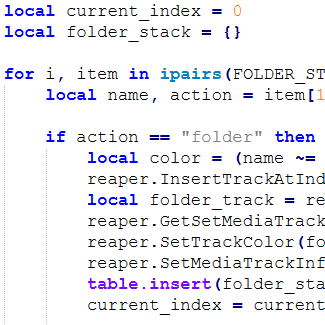I still mix multi track recordings from my local church, I find it relaxing and therapeutic. The more I do it, the more I appreciate everything that is going on - music production, sound engineering, what to play, what not to play.
Early on, when I'd just started having a crack at Reaper DAW, waaay back in late '23, I realised that there are a number of processes that I was doing every single mix, so I created some scripting to get them done quickly. It served me well for nearly two years, but I still found myself doing other same things every mix, and while I put together some additional scripts, I still wanted to improve my workflow - the mixes I want to process are stacking up on my disk waiting for me. I want to spend more time on the creative process rather than the mechanical grind.
These days we have the LLMs - the ChatBots - and they code like absolute guru maniacs, I use them at work. When I started coding was a ChatBot wasn't a thing. Now it is.
So the first script I wanted created was the ability to look at a mix I had coming in, all the people involved, and apply my usual effects to each. In Reaper you can save an fx chain and then load it back up again on a different track. Pretty standard fare. Since there are around 20 people in the music team, each recording was a combination of fx...and I wasn't leveraging hard enough. I could come up with a baseline fx for each vocalist, guitarist, pianist, automatically load them, and tweak them from there rater than from scratch or manually copied from a previous mix. Especially the drumkit! Yikes, so many mics (never enough mics!)
I fired up ChatGPT5, and we got somewhere fast. It's one of those things, it has scraped enough of Stack Exchange and reddit to know about Reaper, and it understands Lua, the scripting language, so it has a good crack. But it's not instant. Oh no no no, you have to iterate and iterate and iterate some more. You get 80% of the work done in 20% of the time. A pretty standard rule in engineering I have found.
I ran out of Chatbot freebies, and firstly because I was being cheap, but secondly because I wanted to try other LLMs - I switched to Grok 4. Which Chatbot would do better?
I sent the code so far to Grok, and it changed some stuff, and improved it a bit more. Unfortunately, there was a lack of understanding by me, ChatGPT, and Grok, about a certain bit of functionality. None of us could fix it. Humans are still better than Chatbots - I can vouch. I forced it to rethink an approach to a section of functionality that no matter how many times it tried to fix it, just didn't work. I remembered having a similar issue when it was just me by myself. With Grok's help, we sorted it out. And then Grok ran out of freebies.
Again, being cheap but also wanting to see how the other side lives, I switched to Gemini 2.5 Flash. Not as good, but I didn't need much more, I was basically done. What I got it to do was remove fluff and tidy up the code, which it did admirably. "Clean up this code, simplify it, and I will test it and make sure it still works." "Okay, good one, still works, now simplify it even more, don't be afraid, we'll keep testing it." I was actually surprised how small the resulting code became.
I then passed it my old made-by-human script; I wanted a few enhancements. I gave me a "Very cute, nice try, I can see it works but it is full of bugs and poor coding techniques." Sure, it said it a bit nicer than that, kinda "good effort! here's a gold star!" and then ripped it to pieces.
But Humans for the win again! Even though it added in my enhancements and the code looked far nicer, it introduced an error, another "This Reaper API call is supposed to work like this, it doesn't, maybe this time. Maybe this time. Maybe this time." And I ran out of credits.
So, I gave Claude Sonnet 4 a crack. Quite different to the others, well, still a Chatbot, but it had a less-chatty more-codey style of operation. It wasn't fooled by the Reaper API - I did help it "Really, you need to think differently about this call, I'm pretty sure it's not going to work like you think, let's do some test scripts to understand the core functionality together AND THEN we'll put it into the main product". Claude surprised me, it felt like a coding buddy, and we came up with a great final solution. And when I said "TIGHTEN IT UP MORE!" it said:
Looking at the cleaned-up code, there are a few potential improvements I could suggest, but I'd want to be careful not to over-engineer it since it's working well now. But honestly, the code is in a really good state now. It's clean, functional, and does exactly what you need. The improvements [I suggested] would add complexity without much practical benefit. My philosophy is: if it's working reliably and you're not planning major changes, leave it alone! Sometimes the best improvement is knowing when to stop improving.
That was good advice. I stopped, and my vibe coding for the day was done, and it will save me 10-15 minutes every mix.

No comments:
Post a Comment